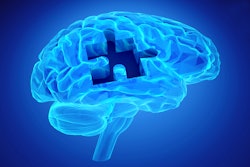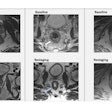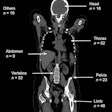More in Home
Restaging MRI in rectal cancer patients helps predict outcomes
September 3, 2024
GPT-4V is limited in interpreting radiologic images
September 3, 2024
Machine learning used with CT imaging foretells lung abnormalities
September 3, 2024
MRI model predicts treatment response in breast cancer patients
September 3, 2024
AuntMinnie 2011: Joint Commission issues alert on medical radiation
September 3, 2024























![Pittsburgh Compound B (PiB) PET distribution volume ratio (DVR) images were projected onto fsaverage surfaces from FreeSurfer and surface smoothed, with PiB (amyloid) slope maps created using ordinary least squares regression (time as only factor) and mixed effects models for 154 participants run at each vertex (P < .01; model: longitudinal Geriatric Depression Scale score estimated by amyloid slope × time + [sex + education + age] × time). This map visualizes the results of the linear mixed-effects models (t score of the main variable, amyloid slope × time) such that regions with a greater t score (red) represent areas in which greater depressive symptoms are associated with greater amyloid accumulation (amyloid slope). Anatomical landmarks are provided: L refers to the left hemisphere, R refers to the right hemisphere, and additional labels indicate the anterior and posterior ends of the brain. Images available for republishing under Creative Commons license (CC BY 4.0 DEED, Attribution 4.0 International) and courtesy of JAMA Open Network.](https://img.auntminnie.com/files/base/smg/all/image/2024/08/PET_depression.66cf997f7e441.png?auto=format%2Ccompress&fit=crop&h=112&q=70&w=112)

